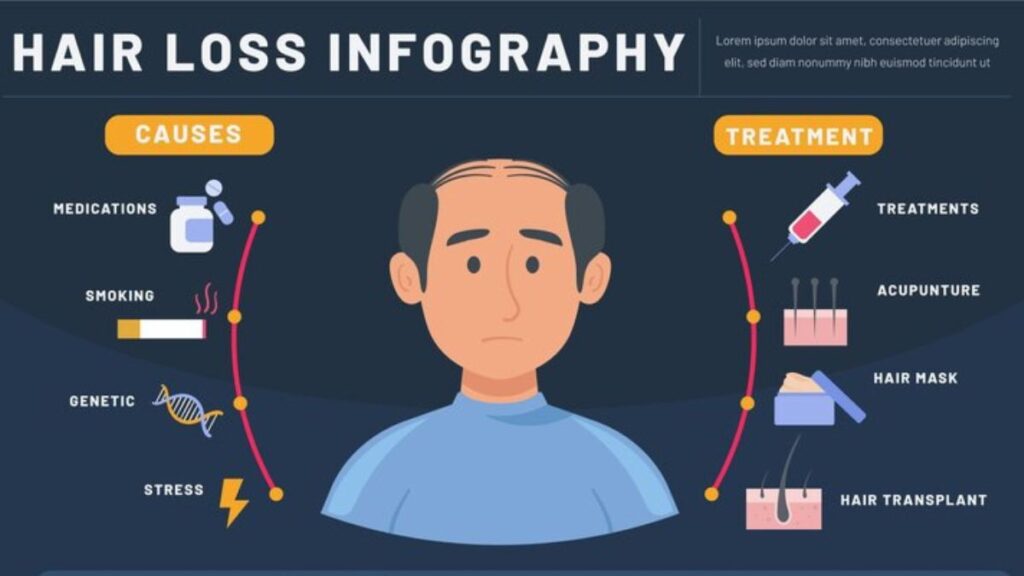Hair loss is a common concern that affects millions of people worldwide, regardless of age or gender. It can be triggered by various factors, including genetics, hormonal changes, nutritional deficiencies, and stress. The following six effective treatments can help restore your hair’s fullness and improve your confidence, allowing you to regain your self-esteem.
Minoxidil
Minoxidil is a topical solution that is applied directly to the scalp. It has been approved by the FDA for treating hair loss in both men and women. This treatment works by stimulating hair follicles and promoting blood circulation in the scalp, which can lead to hair regrowth. Clinical trials have shown that about 40% of users see moderate to extensive improvement in hair growth within a few months of consistent use. Minoxidil is available in different strengths, allowing users to choose the option that best suits their needs. Some individuals may experience mild irritation or itching, but most tolerate it well. Regular application is essential; missing doses can impede progress. As a long-term treatment, patients should not expect immediate results, as consistent use is necessary for effective outcomes.
Finasteride
Finasteride, more commonly known by its brand name Propecia, is an oral prescription medication designed to treat male pattern baldness. It works by inhibiting the hormone responsible for shrinking hair follicles, offering a viable solution for those facing androgenetic alopecia. Users may start noticing results within three to six months; up to 65% of men report a halt in hair loss progression after consistent use. However, it is important to consult a healthcare provider before starting this medication. Some users might experience side effects, such as decreased libido or erectile dysfunction. Despite these potential issues, many men find that the benefits of regaining hair outweigh the drawbacks.
Platelet-Rich Plasma (PRP) Therapy
Platelet-rich plasma therapy is an innovative treatment option that harnesses the body’s own healing properties. This procedure involves drawing a small amount of blood from the patient, processing it to concentrate the platelets, and then injecting the plasma back into the scalp. The growth factors found in platelets stimulate hair follicles, promoting natural hair growth. Studies show that PRP can significantly improve hair density, with positive results seen in about 75% of patients. The treatment typically requires multiple sessions spaced several weeks apart to achieve optimal outcomes. While recovery time is minimal, post-treatment instructions must be followed to ensure efficacy. Although PRP therapy can be costly, many patients view it as a worthwhile investment in their appearance. Side effects are usually mild, such as temporary swelling or discomfort at the injection sites. For those looking to find solutions for hair loss, PRP is a compelling alternative worth considering. Consulting a qualified specialist is essential to determine whether this therapy is suitable for your specific needs.
Hair Transplant Surgery
For individuals seeking permanent solutions to hair loss, hair transplant surgery presents a viable option. This surgical procedure involves relocating hair follicles from dense areas of the scalp to thinning or bald regions. Two primary methods exist: Follicular Unit Transplantation (FUT) and Follicular Unit Extraction (FUE). FUT involves removing a strip of scalp, while FUE extracts individual follicles. Both techniques are effective, but FUE is less invasive and often preferred due to minimal scarring. Patients usually experience noticeable results within several months as the transplanted hair begins to grow. The longevity of results is impressive, but maintaining the health of existing hair is crucial. Candidates should seek a qualified surgeon with a solid track record to minimize risks and complications.
Nutritional Supplements
Diet plays a crucial role in hair health, and nutritional deficiencies can exacerbate hair loss. Supplements like biotin, iron, vitamins A and D, and omega-3 fatty acids have been scientifically linked to improved hair growth. Biotin, in particular, has gained popularity as a hair-growth booster, though individuals should not solely rely on it without a well-rounded diet. In some studies, taking hair-specific vitamins has resulted in a reduction in hair shedding, addressing issues related to thinning hair. While supplements can support healthy hair growth, they should be treated as an adjunct to other treatments rather than standalone cures. Consulting with a healthcare provider or nutritionist can help identify deficiencies and tailor an appropriate supplement regimen.
Low-Level Laser Therapy (LLLT)
Low-Level Laser Therapy (LLLT) is a non-invasive treatment that utilizes lasers to stimulate hair follicles. Studies have demonstrated that LLLT can enhance cellular activity and increase hair growth among both men and women. This therapy is painless, convenient, and can be used at home with laser combs and caps specifically designed for hair restoration. Patients typically note results after several months of consistent treatment, with more visible improvements seen over time. LLLT is often considered safe, with minimal side effects reported. While it may not work for everyone, combining it with other treatments can lead to better outcomes for many. As with any therapy, it’s essential to maintain realistic expectations regarding results and timelines.
Effective hair loss treatment exists and can significantly contribute to regained self-confidence and satisfaction. By exploring options like Minoxidil, Finasteride, PRP therapy, hair transplant surgery, nutritional supplements, and LLLT, individuals can make informed decisions that align with their specific needs. Seek guidance from healthcare professionals before embarking on any treatment journey to ensure optimal and safe results.







